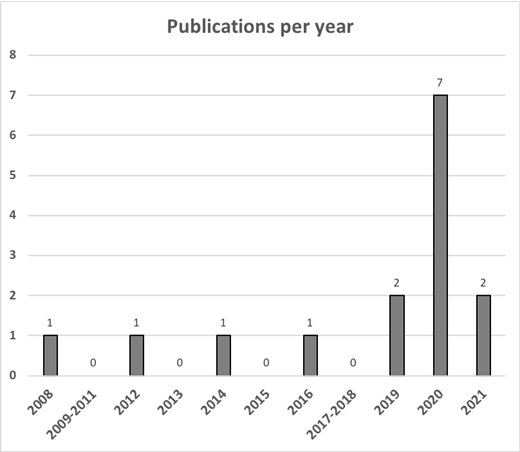Abstract
Background:
The use of virtual care, defined as providing healthcare in ways other than in-person visits, dramatically increased during the COVID-19 pandemic to minimize infection risk and maintain care provision. However, the majority of studies evaluating the use of virtual care in oncology have focused on patients with solid tumor malignancies. Patients with hematologic malignancies represent a unique population related to their underlying malignancy and treatment, but the extent to which virtual care has been successfully integrated into clinical practice is unknown. As the demand for incorporating virtual care into routine clinical practice grows, understanding how to safely and effectively use virtual care in this specific patient population is essential.
Methods:
A scoping review was conducted to describe the use of virtual care in the management of patients with hematologic malignancies and to examine physician- and patient-reported outcomes based on its use. A comprehensive search strategy was used to identify articles on the use of virtual modalities (digital applications, phone visits, or video visits) to deliver routine clinical care to patients with hematologic malignancies published in English between January 2000 and April 2021 in the following databases: PubMed, Medline, EMBASE, CINAHL and Scopus. No restrictions were applied to the phase of care (surveillance, active treatment, and or survivorship). A combination of search terms to encompass hematologic malignancies and virtual care was used. Screening and data abstraction were performed by two independent reviewers (AS, AV) and conflicts were adjudicated by two additional reviewers (DR, AP). Data were extracted to assess the study design, population, setting, patient characteristics, virtual care methodology and study results.
Results:
A total of 350 abstracts were screened and 60 studies underwent full-text review. Of these, 15 studies met inclusion criteria (13 retrospective studies, 1 prospective pilot study, and 1 randomized controlled trial). The majority of papers were published from 2020 onward (Figure 1). Three studies found that app-based tools were effective in monitoring patient symptoms and triggering alerts which resulting in sooner follow-up if indicated. One app-based tool was also used in a resource limited country during the COVID-19 pandemic to allow for communication between hematologists and their patients. Four studies described the use of phone-based interventions for new consults and follow-up visits. Phone visits for used even in high-risk patients (for example, in 29 out of 50 patients with chronic graft-versus-host disease after allogeneic stem cell transplant). Five studies found that videoconferencing, with both physicians and oncology nurses, was highly rated by patients. Emerging themes included high levels of patient satisfaction across all domains of virtual care. Provider satisfaction scores were rated lower than patient scores, with concerns about technical issues leading to challenges with virtual care. Four studies found that virtual care allowed providers to promptly respond to patient concerns, specifically when patients were experiencing side-effects or had questions about their treatment. One study also suggested a decreased risk of death when telemedicine was used to monitor symptoms in patients with diffuse large B-cell lymphoma. There were no data addressing the impact of virtual care on costs or resource utilization.
Conclusion:
The use of virtual care in patients with hematologic malignancies appears to be feasible, even in high-risk populations. Patients were highly satisfied with virtual care, although providers had some challenges related to the specific technologies. More research is needed to evaluate the optimal method of integrating virtual care, informed by a wider range of patient-related outcomes, as well as the downstream consequences of this integration for patient, providers, and health systems.
Prica: Astra-Zeneca: Honoraria; Kite Gilead: Honoraria.


This feature is available to Subscribers Only
Sign In or Create an Account Close Modal